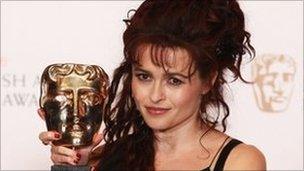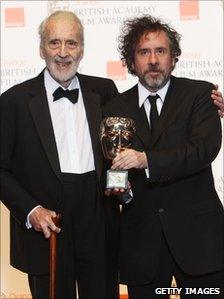King's Speech reigns over Bafta awards
- Published
Colin Firth: ''"I like coming here, thank you Bafta''
The King's Speech ruled at the Baftas, winning seven awards including best film and best actor for Colin Firth.
It also won outstanding British film, best original screenplay, supporting acting honours for Helena Bonham Carter and Geoffrey Rush, and best score.
Firth, who also won the best actor Bafta last year for A Single Man, joked: "I like coming here."
Viewing figures for the awards on BBC One were the highest since 2004, with an average of 5.3 million tuning in.
At its peak, the broadcast - shown with a two-hour time delay - was watched by a peak of 5.8 million.
Firth is the first star to win the best actor Bafta two years' running since the late Rod Steiger won back-to-back Baftas for The Pawnbroker in 1967 and In the Heat of the Night in 1968.
Bonham Carter, who plays Queen Elizabeth opposite Firth's King George VI, said: "I'm so used to losing, it's quite a strange feeling to win."
The film is about the friendship that develops between the stammering monarch and his unorthodox speech therapist, played by Rush.
"It's amazing this little film seems to have spoken to the world and I'm deeply moved by that," said its writer David Seidler.
"For a stutterer, a stammerer, to be heard is a wonderful thing."
The film's producers said it could not have been made without the UK Film Council, which is soon to be abolished.
Tanya Seghatchian, head of the UK Film Council's Film Fund, said: "The King's Speech represents a great validation for the UK film industry as a whole and an amazing legacy for the UK Film Council."
The Social Network's stars, Jesse Eisenberg and Andrew Garfield, accepted the best director award on David Fincher's behalf.
The movie, about the creation of social networking phenomenon Facebook, also won Baftas for best adapted screenplay and best editing.
Social Network writer Aaron Sorkin said: "Normally I'd be excited about this, but sitting in the seat in front of me was one of the Beatles."
Sir Paul McCartney had presented the best score award.
Ahead of the ceremony, Sorkin said: "It is a huge honour [to be nominated]. If you're an American writer, what you really want to be is a British writer and this is as close as I'll get."
Natalie Portman, whose pregnancy stopped her flying to the UK for the ceremony, won best actress for her portrayal of a tortured ballerina in Black Swan.
Director Darren Aronofsky praised her dedication to the role as he accepted the prize on her behalf.
But it was a largely disappointing night for the film, which had garnered 12 nominations in all.

Bonham Carter stars opposite Colin Firth playing his supportive wife
Rush was not there either to collect his supporting actor award due to stage commitments in New York.
In her acceptance speech, Bonham Carter thanked the royal family.
"I think I should thank the royal family frankly, because they've done wonders for my career.
"I seem to be playing queens with ever decreasing headsizes," joked the actress, who also played the large-domed Red Queen in Alice in Wonderland.
The King's Speech also won best original score.
Composer Alexandre Desplat, who also wrote the score for The Queen, joked: "I didn't expect after writing for The Queen to be called for royal duties again."
Unsurprisingly, Toy Story 3 was named best animation feature film.
Best foreign film went to The Girl with the Dragon Tattoo, based on late Swedish crime writer Stieg Larsson's best-selling novel.
Christopher Nolan's Inception picked up three technical prizes for its sound, production design and special effects.
Tom Hardy, who stars in Inception, won Bafta's Rising Star award, voted for by the public, while Roger Deakins won the best cinematography prize for Western remake True Grit.

Tim Burton (right) presented Sir Christopher Lee with his award
Chris Morris's satire Four Lions won the outstanding debut prize, though he was not there to collect his award.
Prizes for best make-up and hair and best costumes went to Alice in Wonderland.
Until the River Runs Red, made at the National Film and Television School, won best short film, while the prize for best short animation went to Michael Please's The Eagleman Stag.
Broadcaster Jonathan Ross, host of the event at London's Royal Opera House, opened the evening with a series of quick-fire gags.
He told the Americans in the audience at the Covent Garden venue: "This is pretty much what all of Britain looks like, apart from one street where Ken Loach lives with Mike Leigh in a council flat."
He also promised that controversial Golden Globes host Ricky Gervais would not be allowed into the building.
Firth has already won a Golden Globe and a Screen Actors Guild award for his King's Speech performance, for which he has also received an Oscar nomination.
The 50-year-old was recognised again last week at the London Film Critics' Circle awards.
Danny Boyle's 127 Hours had received eight Bafta nominations but went home empty-handed.
Ahead of the ceremony, Boyle said that it was "very nice to be included".
"I suspect we'll be bridesmaids tonight but there's nothing wrong with bridesmaids," he added.
Harry Potter creator JK Rowling said seeing her books made into films had been "one of the best experiences of my life" as the series was honoured for its outstanding contribution to British Cinema.
And Sir Christopher Lee was honoured with the Academy's prestigious Fellowship, receiving a standing ovation as he took to the stage.
"I'm glad I don't follow in the footsteps of the great Stanley Kubrick, whose award was posthumous," he quipped as he accepted his honour from director Tim Burton.
- Published13 February 2011
- Published15 February 2011